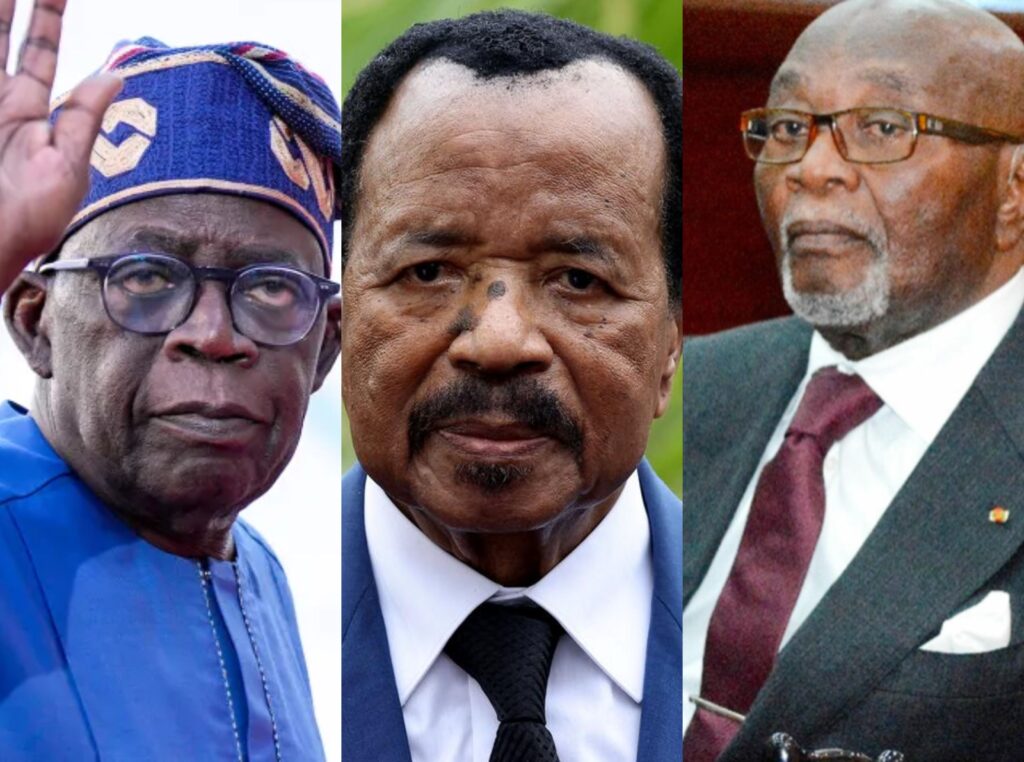Cameroon’s 2025 presidential election has once again drawn global attention to Africa’s ageing political leadership. President Paul Biya, now 92, has ruled the Central African nation for more than four decades, making him one of the world’s longest-serving and oldest heads of state.
His continued dominance in politics despite his advanced age reflects a broader pattern across the continent, where several leaders in their 70s, 80s, and even 90s remain firmly in power.
From Equatorial Guinea’s Teodoro Obiang Nguema to Nigeria’s Bola Tinubu, the persistence of elderly presidents highlights both the continent’s leadership longevity and the widening generational gap between rulers and the continent’s youthful population.
Below is a list of the ten oldest presidents in Africa as of 2025.
ALSO READ: Top 10 Countries in Africa with the Most Expensive Internet Data: 2025 Rankings
10 oldest presidents in Africa as of 2025.
1. Paul Biya, Cameroon – 92 years old
At the top of the list is Cameroon’s Paul Biya, who at 92 is not only Africa’s oldest president but also the longest-ruling non-royal leader in the world. In power since November 1982, Biya has governed Cameroon for over forty (40) years, making his presidency a defining feature of the nation’s political life across generations.
2. Jean-Lucien Savi de Tové, Togo – 85 years old
At 85, Togo’s Jean-Lucien Savi de Tové made history in May 2025 as the oldest person ever to assume the presidency in his country. His rise followed constitutional reforms that established Togo’s Fifth Republic, marking a major political transition.
ALSO READ: Top 10 African Passports with the Most Visa-Free Destinations: October 2025 Power Rankings
3. Alassane Ouattara, Ivory Coast – 83 years old
Alassane Ouattara has led Ivory Coast since 2010, making him one of West Africa’s longest-serving leaders. At 83, the former IMF economist continues to guide his nation’s economic and political path, despite ongoing calls for generational renewal.
4. Teodoro Nguema Mbasogo, Equatorial Guinea – 83 years old
Equatorial Guinea’s Teodoro Nguema Mbasogo has ruled since 1979 after seizing power in a military coup. Now 83, he holds the title of Africa’s longest-serving president and the second longest-serving non-royal leader in the world after Paul Biya.
ALSO READ: Top 10 Countries in the World with the Highest Number of Dollar Millionaires: 2025 Rankings
5. Emmerson Mnangagwa, Zimbabwe – 83 years old
Zimbabwe’s Emmerson Mnangagwa, also 83, took office in November 2017 following the dramatic ousting of Robert Mugabe. A veteran of the ruling ZANU-PF party and a former vice president, his tenure continues Zimbabwe’s tradition of leadership by political veterans.
6. Yoweri Museveni, Uganda – 81 years old
Uganda’s Yoweri Museveni has governed since 1986, making him one of the continent’s most enduring leaders. At 81, his administration has spanned nearly four (4) decades, introducing policies that have both modernised and divided Ugandan society.
ALSO READ: Top 10 Most Beautiful Hotels in the World: 2025 Rankings
7. Joseph Boakai, Liberia – 80 years old
Joseph Boakai became Liberia’s 26th president in January 2024 after decades of public service, including serving as vice president under Ellen Johnson Sirleaf. At 80, his election made him one of the oldest leaders to take office in Africa.
8. Abdelmadjid Tebboune, Algeria – 79 years old
Algeria’s Abdelmadjid Tebboune, 79, assumed office in 2019 following the resignation of long-time leader Abdelaziz Bouteflika. As North Africa’s oldest president, Tebboune’s tenure represents continuity in a region often dominated by long-serving leaders.
ALSO READ: Top 10 Cleanest Countries in the World: Latest Rankings
9. Ismail Omar Guelleh, Djibouti – 77 years old
Ismail Omar Guelleh has led Djibouti since 1999, succeeding his uncle as president. At 77, his 26-year rule has helped turn the small Horn of Africa nation into a key strategic hub, although human rights organisations have criticised his administration.
10. Bola Ahmed Tinubu, Nigeria – 76 years old
Nigeria’s Bola Ahmed Tinubu closes the list at 76, though his exact age remains a topic of debate, with some alleging he could be older. Regardless, Tinubu currently leads Africa’s most populous nation, playing a central role in its economic and political direction.
ALSO READ: Top 10 Best Airports in Europe: 2025 Rankings
Conclusion
The concentration of elderly leaders across Africa raises questions about succession planning, democratic renewal, and leadership transition. While experience and continuity bring stability, critics argue that such extended tenures can stifle innovation, limit generational change, and slow the emergence of younger leaders equipped to address Africa’s evolving challenges.
Discover more from Ghana Scoop
Subscribe to get the latest posts sent to your email.



